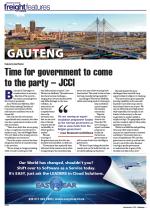In a world gripped by fear and panic, agile business innovations are key to surviving the Covid-19 pandemic.This is according to business survival specialist and founding partner of Marang Advisory Partners, Tlhalefo Mphuthi, who says that more than ever before companies need to keep customers at the centre of their focus.
Addressing a Road Freight Association (RFA) virtual conference recently, Mphuthi acknowledged that developing an agile organisation was not that easy in the current tough economic environment.“The Covid storm has hit the economy hard and businesses are having to cope with a lot of change at present. This inherently requires some agility,” he said. “Change will remain a constant going forward. Organisations must look at restructuring to ensure they are now compassionate, adaptable and collaborative in their approach.”
According to Gavin Kelly, CEO of the RFA, the road freight sector has been hit hard by the pandemic and companies are under severe pressure.“One thing we have learnt as we look to the future is that we can operate pretty well with far fewer resources and lower cost than we have done. This is going to be a disruptor,” he said.
“Do we still need big offices and all that comes with them to run and operate our businesses well?” This is especially true for the largely urban province of Gauteng which is further impacted by its geography. Far from its nearest port, its supply chains have come under extreme pressure as Covid-19 slowed trade, not only locally, but globally.While the Gauteng government has implemented plans to mitigate the impact of Covid-19, companies wanting to weather this particular storm must improve agility.
According to Mphuthi, this is the ability to make a quick, effective and sustained change as the market environment changes, with the customer at the centre.“Amazon and Distell are two good examples of companies that have showcased extreme agility. If one looks at Distell, it still posted a profit despite facing an alcohol ban at the start of the lockdown. Leveraging their asset base the company started manufacturing alcohol sanitisers.”
While the earnings were not as high as they would have been had the business not been disrupted by Covid-19, it still made a profit compared to many other alcohol manufacturers which recorded losses.“The RFA has also showcased its agility during this crisis - moving to a collaborative approach and sharing information with the industry at large,” said Mphuthi.
“Organisations will have to foster new mindsets within their businesses and empower teams for agile ways of working. This will require being more creative and innovative – especially in the very competitive urban environments.”
He said profound shifts would have to be made. “Instead of being reactive, the new normal requires a creative approach. There will have to be a shift from control to empowering and from an authoritative approach to one that embraces partnerships.”While there was no one-size fits-all approach that could work, Mphuthi advised the logistics industry to approach operations with an open mind and a learning attitude.

